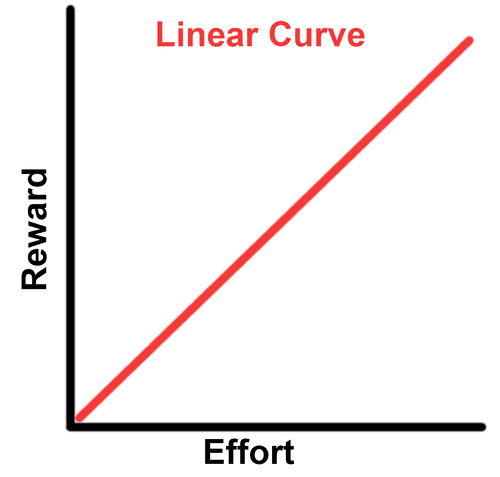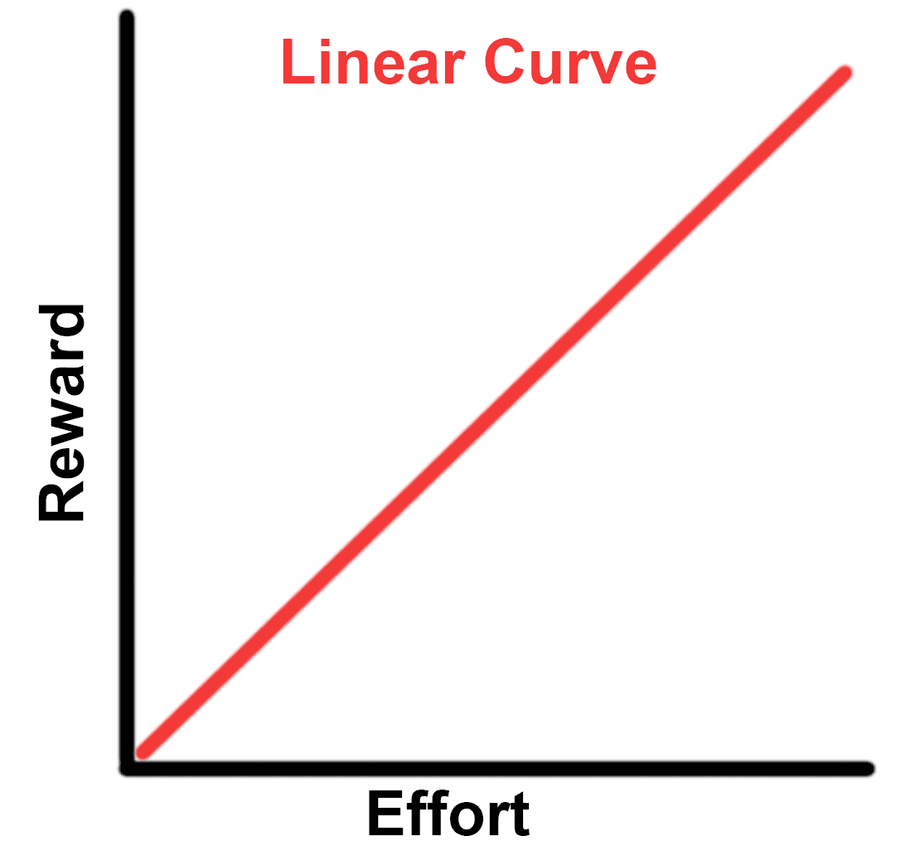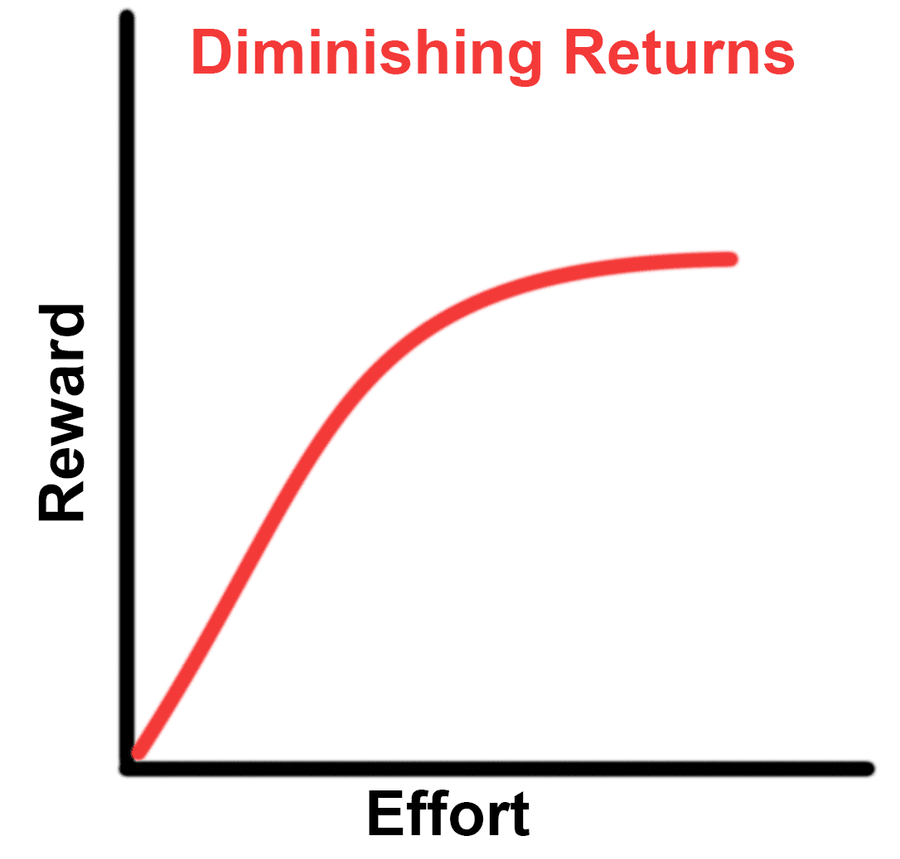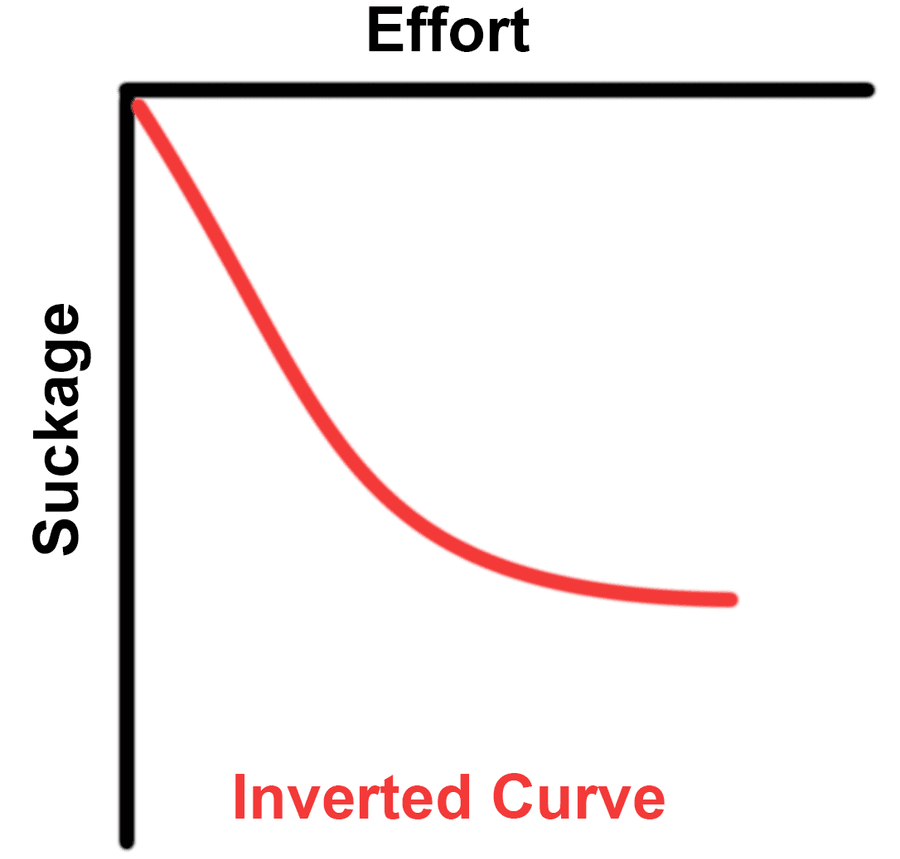Explore the World's Best Ideas
Join today and uncover 100+ curated journeys from 50+ topics. Unlock access to our mobile app with extensive features.
Assumption Of A Linear Curve
Most people assume the relationship between effort and reward is one-to-one. We think that working twice as long will produce twice the results. That caring about a relationship twice as much will make everyone feels twice as loved.
However, most of the world does not exist on a linear curve. Linear relationships only exist for mindless, rote, repetitive tasks—driving a car, filling out reams of paperwork, cleaning the bathroom, etc. because they require no thought or ingenuity.
38
183 reads
The Diminishing Returns Curve
Diminishing returns means that the more you experience something, the less rewarding it becomes. The concept of diminishing returns applies to most experiences that are complex and novel, and even many of the mundane ones. They apply in cases like money, eating, sleeping, work productivity and even friendships.
All give back less the more you do them, the more you try, or the more you have. All operate on a diminishing returns curve.
36
122 reads
The Inverted Curve
Here, effort and reward have a negative correlation—that is, the more effort you put into doing something, the more you will fail to do it.
Effort and reward have a linear relationship when the action is mindless and simple. Effort and reward have a diminishing returns relationship when the action is complex and multivariate.
But when the action becomes purely psychological—an experience that exists solely within our own consciousness—the relationship between effort and reward becomes inverted.
37
127 reads
Where Does The Inverted Curve Apply?
- Control- The more we accept our feelings and impulses instead of controlling them, the more we’re able to direct and process them.
- Freedom- It’s only by limiting ourselves–by choosing and committing to certain things in life–that we truly exercise our freedom.
- Happiness- Trying to be happy makes us less happy. Accepting unhappiness makes us happy.
- Security- Being comfortable with uncertainty is what allows us to feel secure.
- Love- The more we try to make others love and accept us, the less they will, and the less we will love and accept ourselves.
- Respect- The more we ourselves respect others, the more they will come to respect us.
- Trust- The more we try to make people trust us, the less inclined they will be to do so.
- Confidence- The more we accept our faults, the more comfortable we will feel in our own skin.
- Change- The more we accept ourselves, the more we will grow and evolve.
- Meaning- The more we pursue a deeper meaning or purpose to our lives, the more self-obsessed and shallow we will become.
42
91 reads
Why Does This Happen?
These internal, psychological experiences exist on an inverted curve because they are both the cause and the effect of the same thing: our minds. When you desire happiness, your mind is simultaneously the thing that is desiring and the target of its own desires.
The goal is to take your mind and teach it to stop chasing its own tail. To teach it to achieve what it desires by giving up what it desires. To show it how the only way to reach the surface is to let itself sink.
34
83 reads
How Do We Stop Chasing Things?
By letting go, by giving up and by surrendering. Not out of weakness. But out of a respect that the world is beyond our grasp. By recognizing that we are fragile and limited and but temporary specks in the infinite reaches of time. You do it by relinquishing control, not because you feel powerless, but because you are powerful. Because you decide to let go of things that are beyond your control. You decide to accept that sometimes, people won’t like you, that often you will fail, that usually you have no clue what you’re doing.
38
67 reads
"The harder we try with the conscious will to do something, the less we shall succeed. Proficiency and results come only to those who have learned the paradoxical art of doing and not doing, or combining relaxation with activity."
ALDOUS HUXLEY
39
117 reads
IDEAS CURATED BY
Purvankit khadatkar's ideas are part of this journey:
Learn more about personaldevelopment with this collection
How to build a network while working remotely
How to work remotely
How to manage finances while working remotely
Related collections
Similar ideas
6 ideas
This Is How To Have A Long Awesome Life
bakadesuyo.com
4 ideas
Productivity and Happiness: Why Are We So Busy?
tinybuddha.com
3 ideas
The Most Important Question of Your Life
markmanson.net
Read & Learn
20x Faster
without
deepstash
with
deepstash
with
deepstash
Personalized microlearning
—
100+ Learning Journeys
—
Access to 200,000+ ideas
—
Access to the mobile app
—
Unlimited idea saving
—
—
Unlimited history
—
—
Unlimited listening to ideas
—
—
Downloading & offline access
—
—
Supercharge your mind with one idea per day
Enter your email and spend 1 minute every day to learn something new.
I agree to receive email updates






